When Laetitia E. Landon edited Fisher’s Drawing Room Scrapbook she had complete editorial control and wrote all poems that she paired with engravings, particularly those depicting scenes from India. I assume that when Howitt became editor of the Scrapbook, she also write the poems accompanying the annual’s engravings. — George P. Landow

THE wisdom of the old Egyptian sages
Had sealed that pyramid's remotest chamber
Where, wrapped in linens, steeped in musk and amber,
The Pharaoh slept within his tomb of ages.
The Pharaoh woke: “Wherefore is this awaking!
To whom hath this mysterious chamber yielded?
I saw the bricks burnt wherewith it is builded—
What means this light which o'er mine eyes is breaking!
“What mean the words which I hear round me bruited,
Of change?—There were no changes when I reigned;
The neck of prostrate man my foot sustained;
I ruled the world; was Pharaoh–God—saluted
“Who are they that my sacred tomb have entered?
English and French l—They are unknown to me;
And this Mohammed Ali–who is he,
That in the Pharaoh's land a change hath ventured?
“I hear them speak strange words that have strange meanings;
Yet though their hieroglyphics, few and common,
Are read by every man, and child, and woman,
Of our large knowledge have they slender gleanings.
“Let them go on—these lesser kings and sages,
English or French are all alike to me!
How fares Mohammed Ali's change I’ll see
When next I waken, after a sleep of ages!”
This extraordinary man, who has now for many years excited so much attention, by his career and successful policy, from the kingdoms of Europe, and who has done more than any other man who ever appeared, to dismember the Turkish empire, and to introduce Christian arts and social economy into the very bosom of Islamism, was born at Cavala, a village of Macedonia, in 1769, the same year which also produced the two most remarkable men of any age—the Duke of Wellington and Napoleon Bonaparte. He was early left an orphan, but by his distinguished qualities of both body and mind, attracted the attention and favour of the Turkish governor of Cavala, and thus laid the foundation of his fortune.
It would require a volume to trace that splendid, though often bloody and treacherous career—in which the establishment of the independent sovereignty of Egypt; the murder of the Mamelukes; the invasion of Arabia; the war against the liberties of Greece; the conquest of Asia Minor, and of Syria; and the introduction of education, of the olive and the mulberry, of vaccination and the laws of quarantine; of sugar refineries, saltpetre manufactories, cannon, foundries, and various other scientific and commercial innovations into Egypt, planting that ancient country, once more, in fact, after a long night of ages, on the foundation of revived empire—are amongst the splendid events of one of the most extraordinary lives within the whole compass of human history; -a life, nevertheless, not without its signal reverses, as it is not without its foul and sanguinary blots.
The destruction of the united fleets of the Sultan and of Mohammed Ali at Navarino, and the recent wresting of Syria out of his hands by the European Powers, with England at their head, measures whose intrinsic merits we do not here attempt to discuss, have at once served to mingle that bitterness in the cup of Mohammed Ali's prosperity, which is the portion of the most glorious of mortal fortunes; and to show, great as may be his power, supported by the brilliant military genius of his son Ibrahim Pacha, compared with that of the Mussulman nations—how infinitely far above it, still soars the gigantic greatness of the Christian race| [38-39]
Bibliography
Howitt, Mary, Ed. Fisher’s Drawing Room Scrapbook. London: Fisher, Son, & Jackson, 1843. Hathi Trust Digital Library version of a copy in the New York Public Library. Web. 3 August 2020.
Created 3 August 2020